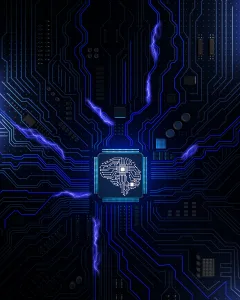Imagine a world where every child has access to an enriched educational experience, tailored to their individual needs and strengths. This is the dream of education researchers and teachers: To unlock the power of Artificial Intelligence (AI) and use it to drive further breakthroughs in personalized education.
Personalized education leverages theories and data-driven strategies formed around improving one-on-one relationships between educators and students, utilizing intelligent teaching tools such as AI-driven personalized learning platforms, autonomous tutoring and computer-assisted practice exercises. All these components create a powerful foundation for individualized student strategies–learning experiences adapted to each student’s level of expertise.
Can AI take us even farther towards this goal? Can we go beyond traditional limits to push past any boundaries? How can artificial intelligence be harnessed to help drive improvements & deeper understanding in personalized education?
The answers lie within this blogpost “Unlocking the Power of AI: The Critical Role of Artificial Intelligence in Personalized Education. The key concepts like adaptive learning, individualized learning, differentiated learning, competency-based learning will be explored with unique insights and real life stories, creating a vivid scene that demonstrates how AI is being used in effective ways within classroom settings. Follow us on this journey as we unlock the potential benefits found in using these intelligent teaching tools.
Personalizing Education with AI
 The advancement of Artificial Intelligence (AI) in personalized education is rapidly transforming the way learners pursue their educational goals. AI-driven tutoring systems, interactive study programs, and other Learning Automation Platforms are making it possible to customize educational experiences in ways that weren’t previously thought possible. With intelligent tutoring systems using AI techniques and Cognitive Science to enhance and personalize learning through virtual tutors, individualized instruction and tailored responses to students are now available in an automated format.
The advancement of Artificial Intelligence (AI) in personalized education is rapidly transforming the way learners pursue their educational goals. AI-driven tutoring systems, interactive study programs, and other Learning Automation Platforms are making it possible to customize educational experiences in ways that weren’t previously thought possible. With intelligent tutoring systems using AI techniques and Cognitive Science to enhance and personalize learning through virtual tutors, individualized instruction and tailored responses to students are now available in an automated format.
But how exactly do AI-powered educational tools work? How do these self-learning algorithms help improve one’s learning experience? As AI continues to rise in popularity with both educators and learners alike, many have started leading the charge on combining technology with teaching techniques. With a number of well-known applications now existing, including renowned programs such as Practical Algebra Tutor and eTeacher, the possibilities for innovative personalized learning programs only increase day by day.
Despite its current prevalence–and ever presence–in numerous aspects of contemporary life, there’s still much mystery surrounding AI. Just how effective is this new approach when it comes to achieving top-tier educational results? How can learners make the most of their educational experience without spending too much money on costly traditional methods? Will this innovation trigger a revolution not just in education but other domains as well? The unknowns surrounding Artificial Intelligence make it a powerful persuasive tool that has ushered us into a new era of opportunity and exploration that rewards those who take up its challenge.
Real-time Learning Analytics and Smart Content Networks
 Real-time Learning Analytics and Smart Content Networks are changing the landscape of traditional education. Leveraging AI technology to create customized educational curriculums is opening up possibilities for personalized learning and data-driven instruction techniques. By utilizing Intelligent Teaching Tools such as real-time analytics, teachers are no longer solely reliant on intuition when it comes to providing their students with tailored education.
Real-time Learning Analytics and Smart Content Networks are changing the landscape of traditional education. Leveraging AI technology to create customized educational curriculums is opening up possibilities for personalized learning and data-driven instruction techniques. By utilizing Intelligent Teaching Tools such as real-time analytics, teachers are no longer solely reliant on intuition when it comes to providing their students with tailored education.
Making use of data collected throughout a student’s learning journey to inform curriculum provides invaluable insight into an individual’s academic strengths and weaknesses, ideal pacing and content areas they may require extra assistance or challenge in. In an environment where one size does not fit all, networked digital laboratories offer evidence against this alternative by being able to customize lessons accurately and efficiently for maximum engagement.
Intelligent teaching tools facilitate data-driven instructional techniques, allowing educators to interpret information effectively as well as offering opportunities for automated feedback loops for both learner and instructor. As each lesson progresses, new questions arise that can be answered directly using real-time analytics, giving teachers the opportunity to adjust lesson plans quickly if needed. Computerized assessments drive instructors toward high levels of adaptation while classroom observations help instructors provide students with targeted feedback to ensure they get the desired outcome from the course or program they are studying.
AI-assisted Assessment Solutions and Data-Driven Instructional Techniques
 AI has significantly advanced the way personalized education is delivered, not just in terms of providing guidance and hints towards right answers but also by giving insight into other students’ responses. Companies like Coursera utilize AI technology to detect incorrect student responses to certain questions – which details a teacher can use to offer more impactful support.
AI has significantly advanced the way personalized education is delivered, not just in terms of providing guidance and hints towards right answers but also by giving insight into other students’ responses. Companies like Coursera utilize AI technology to detect incorrect student responses to certain questions – which details a teacher can use to offer more impactful support.
Data-driven instructional techniques are at the heart of this technology, as they allow teachers to provide individually customized learning experiences that demonstrate real-time learning analytics through smart content networks. For example: AI algorithms can help to identify errors or areas of improvement according to specific trends concerning each student’s progress throughout their studies. This tailored approach allows for more comprehensive feedback and accurate assessment for any individual student’s needs.
AI-assisted software can also benefit collaborative classrooms, as it gives unified access to real-time information between teachers and students from both physical and online waveforms of learning platforms. It provides data on how well (or poorly) each student is performing on their own terms by allowing teachers to pinpoint which content verges on confusion before having the chance for them slipping away from the main point of discussion into total misunderstanding––thus ensuring no one gets left behind.
Conclusion
AI and data are having a huge impact on learning, as savvy educators seek to tailor curricula to students’ learning needs. AI-driven tech is now providing personalized education that can help students succeed academically by delivering content and instruction tailored to an individual student’s learning style. Using AI-based analytics, educators can identify the most effective strategies for individualized student instruction and further optimize those strategies in real time.
Smart Content Networks based on AI are a way of optimally aggregating relevant knowledge from multiple sources into one connected route, which allows even teacher’s with less technical skills to access the content material for their classes. Such networks also provide more specific guidance for targeting your teaching objectives, something that is invaluable in improving student performance.
Though AI may not be able to replace teachers entirely, it has certainly revolutionized how teachers connect with their students and use interactive methods to deliver instructional materials more effectively than ever before. As educational technology continues to evolve and integrate AI into more curriculum tools, personalized education can help achieve better learning outcomes for all students.
